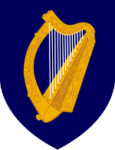Irish language to have equal status with English during Irish EU presidency
 The presidency of the Council of Ministers rotates between the European Union’s member states every six months. The presidency is currently occupied by Cyprus until 30th June 2026.
The presidency of the Council of Ministers rotates between the European Union’s member states every six months. The presidency is currently occupied by Cyprus until 30th June 2026.
On 1st June 2026 the presidency switches to Ireland, which has announced that for the first time in its membership of the organisation, the Irish language will have equal status with English during its presidency.
Irish is recognised by the Constitution of Ireland as the national and first official language of the Republic of Ireland (English being the other official language). However, in spite this, almost all government business and legislative debate is conducted in English.
According to the Irish Times piece, all official documents, policy programmes and press releases will be in Irish and English, while content on the Irish presidency website will be available in Irish, English and French.
Furthermore, the Irish government has also given a commitment that content requiring immediate publication, such as European Council decisions, will be published simultaneously in Irish and English where feasible and within a very short period of each other, if not, with the aim of ensuring that Irish has close to equal status to English during the six-month term of the presidency.
The commitment to the Irish language even extends to encouraging the use of Irish at all formal council meetings in Brussels and Luxembourg and during informal meetings in Ireland.
The Irish EU presidency will also feature cultural programmes involving Irish language literature, arts and music. This programme will be co-ordinated by Culture Ireland in consultation with the Department of the Gaeltacht.
Whereas Irish used to be the first language of the majority of Ireland’s population before the 20th century, its usage has since declined considerably. According to Wikipedia, the total number of people (aged 3 and over) in Ireland who declared they could speak Irish in April 2022 was 1,873,997, representing 40% of respondents, but of these, 472,887 said they never spoke it and a further 551,993 said they only spoke it within the education system.Linguistic analyses of Irish speakers are therefore based primarily on the number of daily users in Ireland outside the education system, which in 2022 was 20,261 in the Gaeltacht and 51,707 outside it, totalling 71,968.








